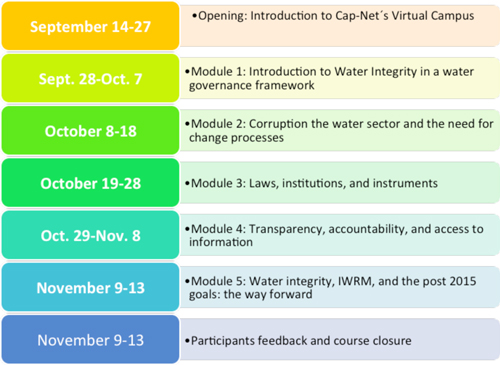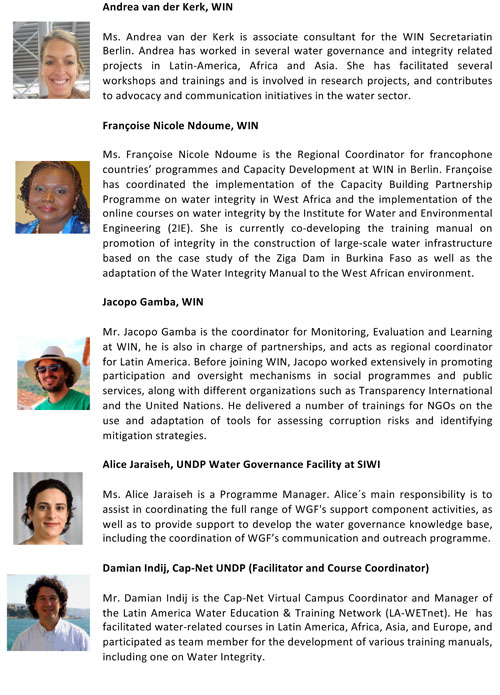The virtual course on ‘Water Integrity and Transparency – Part I: Principles and Concepts’ will take place from 14 September to 13 November, 2015. The objective of this course is to create awareness and strengthen the bases for change in water governance through increased knowledge on how to improve transparency and accountability practices.
By the end of the course participants are expected to:
– understand the main concepts and principles behind water integrity, transparency, and accountability; as well as the ways in which corruption may occur in the water sector, its drivers, and impacts;
– understand the need for effective changes and be familiar with tools that can be applied to achieve water integrity;
– be familiar with examples of good practices related to promoting integrity, accountability and combating corruption in the water sector;
– have access to useful up to date materials in support of specific subject areas for water integrity.
a) Participation
The course is open to a maximum of 40 participants representing various stakeholder groups from the entire water sector world-wide:
– stakeholders and professionals forming part of water management, civil society, river basin or international organizations; development programmes and members of UN organizations; and representatives of the private sector;
– decision makers, policy makers, and high-level professionals and managers active in governmental bodies;
– capacity developers active in the fields of water integrity, sustainable water management, Integrated Water Resources
– Management, Human Rights Based Approaches, representatives of the WASH Media Network, amongst others.
As this an introductory course, participants are not expected to have previous knowledge on water integrity.
b) Registration/Application Procedures (IMPORTANT)
There will be no course fee. However, participants will be selected by the organizing committee based on gender, professional background, and geographic balance, as well as their motivation and commitment to participate throughout the entire course.
Interested participants must complete the online registration form and submit the following documentation to virtualcampus@cap-net.org with subject “Water Integrity virtual course registration”, before Friday, August 28, 2015.
1) Required.A 1-page profile, describing: educational and professional background; experience in water resources management, water capacity development, or decision making; participation in networks and/or alliances; any other relevant information related to the course subject.
2) Required. A 1-page motivation and commitment letter: explaining your interest in participating in the course; availability to dedicate at least 4 hours per week during the course duration and participate in the course activities; and your expectations in terms of how you will apply and share the acquired contents in your field of work and with your colleagues.
3) Optional. A 1-page letter of institutional support through which the institution where you work expresses interest in your participation in the course and explains why this will be an important training for you and the institution.
For more information visit Virtual Campus Website or email us at virtualcampus@cap-net.org
Full brochure in pdf can also be downloaded here.
c) Language
The course language will be conducted in English. Soon, this course will be available in other languages.
d) Contents and Course Structure
The course is structured by modules. Each module will run over 10 days (1.5 weeks), during which course participants must read basic contents and participate in suggested activities.
e) Course features
In all 5 modules, participants are expected to:
- Read basic contents
- Participate in online forum discussions
- Prepare an individual or group exercise
- Respond –by the end of the module- to a set of multiple choice questions
- Optional: Participate in a live session
Participants will also have access to other (optional) recommended readings, videos, and web links.
f) Participants expected dedication
Participants are expected to dedicate a minimum of 4 hours per week to the course. This is estimated on the basis of 1 hour per day (4 days a week), or two connections per week, each one of 2 hours. In total, this should add to 40 hours for the full course, in line with a 5-days face to face course.
This time dedication should be enough to review base contents and participate in all activities (forums, exercises, multiple choices). Participants who wish to read other suggested readings and related videos will require a bit more time.
g) Facilitators
Course contents will be facilitated by a team of specialists representing the Water Integrity Network (WIN); UNDP Water Governance Facility at SIWI, and Cap-Net UNDP. A course coordinator and the virtual campus technical support team will be present along the entire course.
The Water Integrity Network (WIN) is a network of organizations and individuals promoting water integrity to reduce corruption and improve water sector performance worldwide. WIN works to raise awareness on the impact of corruption -especially on the poor and disenfranchised- assesses integrity risk and promotes practical responses. The network’s vision is a world with equitable and sustained access to water and a clean environment, which is no longer threatened by corruption, greed, dishonesty and wilful malpractice.
UNDP Water Governance Facility
The UNDP Water Governance Facility (WGF) at the Stockholm International Water Institute (SIWI) is an initiative that was launched by the United Nations Development Programme (UNDP) and the Swedish Agency for International Development Cooperation (Sida). The programme is a mechanism to implement parts of the UNDP Water Governance Programme. The UNDP Water Governance Facility supports developing countries on a demand basis to strengthen water governance and reduce poverty through policy support and advisory services in multiple thematic areas, including: integrated water resources management, transboundary water, water supply and sanitation, climate change adaptation, South-South collaboration, experience and best practices exchange, gender, and capacity building.
Cap-Net is an international network for capacity development in sustainable water management. It is made up of a partnership of autonomous international, regional and national institutions and networks committed to capacity development in the water sector. At Global level Cap-Net works with 23 regional and country level capacity development networks with about 1.000 member organisations in 120 countries, and numerous international partners. Cap-Net UNDP delivers training and education to water professionals in Asia, Africa, Middle East, Latin America and the Caribbean.
')}



